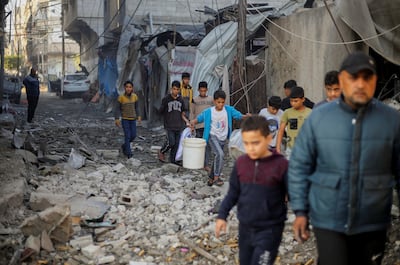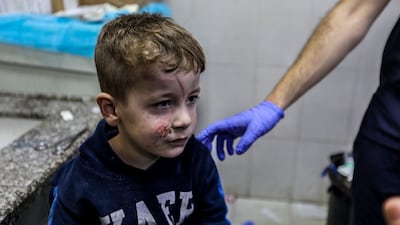Live updates: Follow the latest news on Israel-Gaza
In the intensive care unit of Nasser Hospital in Gaza's southern city of Khan Younis, a severely injured girl has been on a ventilator for weeks without any visitors or family around her.
Despite the thousands of Gazans searching for loved ones affected by Israel's two-month brutal bombing of the Strip, no one has come for her.
The child, who lost both her parents, is now labelled as a WCNSF, or “wounded child, no surviving family”, by medics who say the number of such cases is higher than in any of the numerous wars Gaza has witnessed.
The girl, whose name unknown, is in no condition to communicate with others.
A doctor, who preferred to remain anonymous, told The National that the child had been brought in about a month ago, along with dozens of casualties after an air strike targeted a residential building in the centre of Khan Younis.

Health workers said her identity was unknown, primarily because her injuries were so severe that she was unrecognisable. It was also possible that her entire family had perished.
More than 17,000 people, including thousands of children, have been killed since Israel started bombing Gaza following the deadly Hamas attacks on Israel that left 1,200 people dead. Entire families in the besieged enclave have been wiped out.
No figures on orphans
Ricardo Peris, Unicef's communications manager, told The National that his organisation “is working to gather and provide an accurate number of unaccompanied and separated children and orphans inside the Gaza Strip”.
But “this is very difficult, given the intensity of hostilities and rapidly evolving situation on the ground”.
He said Unicef has been trying to reach hospitals and medics in Gaza to identify and register children and to promote the International Committee of the Red Cross (ICRC) hotline to help reunite children as part of its family links programme.
However, Mr Peris cautioned, “designating safe spaces for these children is presently nearly impossible due to the chaotic and overcrowded conditions in shelters and hospitals. The standard system to identify, document, trace, and reunify children is barely operational” and this is further complicated by communication obstacles and limited access.
According to multiple medics at Nasser Hospital, the precise number of WCNSFs remains unclear as they struggle to document the casualties.
Young and traumatised
In another room inside the hospital, 11-year-old Fatima Zahraa Mohammed El Hasani only has her grandmother beside her, after her entire family of 17 were killed when their home was bombed.
“Fatima is utterly traumatised,” said her grandmother, Etaf El Abadla, struggling to hold back tears, while speaking to The National.
In October, Fatima lost her parents, two siblings, paternal grandparents, uncles, and their children after their home in central Gaza was bombed. Following the tragic event, she was displaced to her maternal grandmother's care in Khan Younis.
Only a few days later, like thousands of others, Mrs El Abadla was forced to relocate with Fatima to the Al Mawasi region due to the intense bombing of their neighbourhood. The 56-year-old and her granddaughter now live in a small tent.
Fatima, who suffered burn injuries in the blasts, cries constantly, her grandmother says.
“She only sleeps in my arms and often wakes up in the middle of the night to ask about her family,” says Mrs El Abadla.
Care of distant relatives
There are concerns over how children without any surviving family members will be cared for in a society where it's culturally unacceptable for an orphan to be raised by a public or private institution.
Orphans in Gaza are typically welcomed into the care of distant relatives, said a local NGO manager, who chose to remain anonymous due to fears of Israeli reprisals.
These relatives often receive support through a kafala system, which involves donations from abroad to help raise and support the orphans.
“Under normal circumstances, monthly donations of $30 or $50 are given to family members who take on the responsibility of raising orphaned children in their extended families,” said the employee.
“We do not have institutions housing orphans. The government does not provide such facilities. It is not culturally accepted.”
He said the continuing war meant thousands of children will need sponsorship and Unicef is collaborating with partners in Gaza to address the issue.
“We are working to identify, register and formalise legal guardianship procedures for all unaccompanied, separated, or orphaned children being taken care of by extended family members,” said Mr Peris.
Last month, Lana Nusseibeh, the UAE's Permanent Representative to the United Nations, highlighted the plight of WCNSFs as she addressed the Security Council.
“By now, we've all heard the heartbreaking acronym coined by healthcare workers in Gaza: WCNSF, which stands for a wounded child, no surviving family. I just want to let that sink in.”
This article is published in collaboration with Egab.

